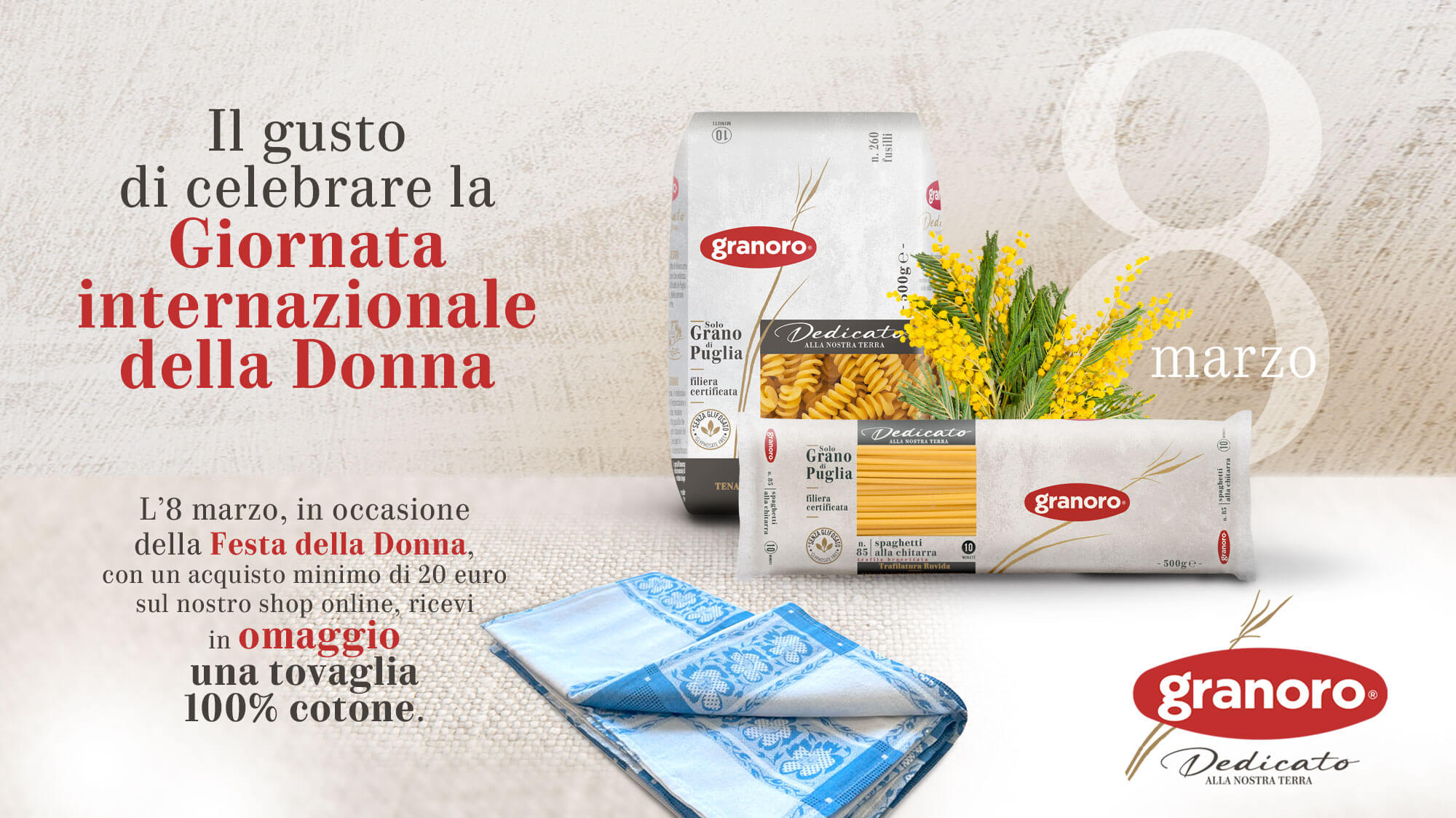Your daily
well-being
Good, healthy, Granoro.

Granoro for your well-being
The application of new and advanced technologies in the production process has gone hand in hand with the ethical and value-based choice to offer consumers high-quality products that, for Granoro, have always coincided with a healthy diet. Supporting and promoting initiatives and partnerships with Associations, Schools and Research Institutes oriented towards health and proper nutrition are part of Granoro's history.
the diet for your health
A quality diet, therefore healthy, natural, which promotes the use of processed foods as little as possible, is essential in slowing down the aging process and in preventing many of the most common chronic diseases. It is, therefore, also an existential choice and is of fundamental importance for health, throughout one's entire lifetime. Correct nutrition, combined with an active lifestyle and physical activity, is the basis for the prevention of many diseases. The Mediterranean Diet, recognised in 2010 as an intangible cultural heritage by UNESCO, is an extraordinary historical and cultural heritage and following it is synonymous with eating well and in a healthy manner.

“Good” habits for a healthy and active life
1. Eat a hearty breakfast
Starting the day with a breakfast rich in healthy foods and possibly low in sugar is important to best face the day and provide the body and brain with the essential nutrients for their maximum performance.

2. Eat lots of fruit and vegetables
Three portions of vegetables and two of fruit a day are real sources of well-being, they provide soluble fibre, necessary to reduce the absorption of fats and sugars, vitamins, minerals and antioxidants.

3. More legumes and wholemeal grains
The importance of soluble and insoluble fibres in our diet. Legumes and wholemeal grains provide carbohydrates, starches and fibres, vitamins, mineral salts and, since they are rich in soluble and insoluble fibres, they are essential to balance intestinal microbiota. Cereals and legumes are also a source of proteins, so they are an essential component of daily nutrition.

4. Drink plenty of water
It is advisable to drink at least one and a half litres of water a day, without waiting until you feel thirsty. Water is essential for the absorption, digestion and transport of nutrients.

5. Little salt
Advanced societies abuse salt intake. Our body needs sodium, which is naturally present in food in sufficient quantities to meet daily needs.

6. Few fats, and quality fats
Fats should not be banned, but it is better to prefer unsaturated fats, such as those found in extra virgin olive oil, fish or dried fruit. These fats are rich in omega-3, which has beneficial effects on the heart and blood circulation.

7. Be careful with sugar
The intake of simple sugars should not exceed 10-12% of daily energy, as our body absorbs them very quickly, feeling hungry even before having had the opportunity to use them for energy purposes.
Therefore, we have the tendency to ingest large quantities of simple sugars again, ending up taking in more calories than we consume. The inevitable result is overweight.

8. Don't overindulge in alcohol
Calories taken in from alcohol produce energy, but they have no nutritional value. They are calories that our body could easily do without and that physiologically have no purpose. Consequently, it is necessary to control their intake. Meals help slow down the absorption of alcohol.

9. Varied diet
The human body needs varied and complete nutrients, rich in proteins, vitamins, carbohydrates, mineral salts and water. For this reason, it is important to follow a varied and balanced diet.

10. More physical activity
Every age needs exercise and regular physical activity, all of which help to improve the quality of life.

1. Eat a hearty breakfast
Starting the day with a breakfast rich in healthy foods and possibly low in sugar is important to best face the day and provide the body and brain with the essential nutrients for their maximum performance.


2. Eat lots of fruit and vegetables
Three portions of vegetables and two of fruit a day are real sources of well-being, they provide soluble fibre, necessary to reduce the absorption of fats and sugars, vitamins, minerals and antioxidants.
3. More legumes and wholemeal grains
The importance of soluble and insoluble fibres in our diet. Legumes and wholemeal grains provide carbohydrates, starches and fibres, vitamins, mineral salts and, since they are rich in soluble and insoluble fibres, they are essential to balance intestinal microbiota. Cereals and legumes are also a source of proteins, so they are an essential component of daily nutrition.


4. Drink plenty of water
It is advisable to drink at least one and a half litres of water a day, without waiting until you feel thirsty. Water is essential for the absorption, digestion and transport of nutrients.
5. Little salt
Advanced societies abuse salt intake. Our body needs sodium, which is naturally present in food in sufficient quantities to meet daily needs.


6. Few fats, and quality fats
Fats should not be banned, but it is better to prefer unsaturated fats, such as those found in extra virgin olive oil, fish or dried fruit. These fats are rich in omega-3, which has beneficial effects on the heart and blood circulation.
7. Be careful with sugar
The intake of simple sugars should not exceed 10-12% of daily energy, as our body absorbs them very quickly, feeling hungry even before having had the opportunity to use them for energy purposes.
Therefore, we have the tendency to ingest large quantities of simple sugars again, ending up taking in more calories than we consume. The inevitable result is overweight.


8. Don’t overindulge in alcohol
Calories taken in from alcohol produce energy, but they have no nutritional value. They are calories that our body could easily do without and that physiologically have no purpose. Consequently, it is necessary to control their intake. Meals help slow down the absorption of alcohol.
9. Varied diet
The human body needs varied and complete nutrients, rich in proteins, vitamins, carbohydrates, mineral salts and water. For this reason, it is important to follow a varied and balanced diet.


10. More physical activity
Every age needs exercise and regular physical activity, all of which help to improve the quality of life.











